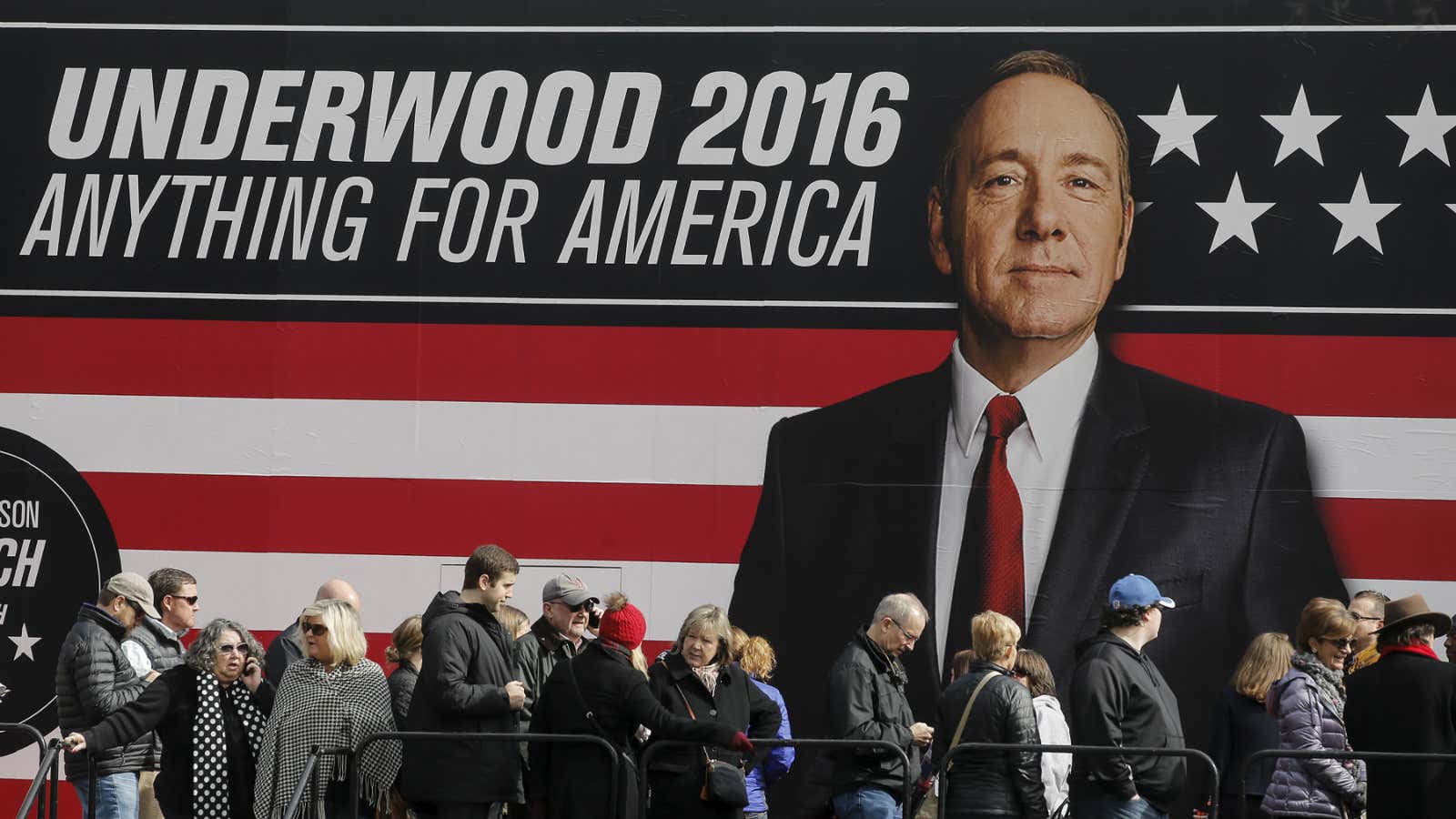Netflix’s House of Cards has a fascinating plot line about oil this season. Without giving away too much, Russia decides to drastically cut production, driving up prices that leave America—and the administration of fictional president Francis Underwood—in the grips of a gasoline crisis. Long lines start forming at the pump and in one scene, Underwood’s former chief of staff Remy Danton can’t buy a few gallons off a fellow motorist no matter how much he offers; in another, political consultants start grappling with the possibility of riots over $7-a-gallon gasoline.
The scenario is an interesting thought experiment, since in the real world Russia is actually producing massive amounts of oil—more than anyone might have expected considering how far crude prices have fallen in the last year and a half—while attempting stir up global interest in at least “freezing” output (forget about cuts) in the hopes that demand might one day catch up.
At home, its major oil companies are on board, and abroad it has worked with Saudi Arabia on the idea, which also has garnered the support of Venezuela, Qatar, and potentially a host of Latin American exporters. Further, Russian energy minister Aleksander Novak will likely be traveling to Iran soon to see if an “individual solution” can be reached to dissuade Tehran from cratering prices further by too hastily returning to its pre-sanctions oil output.
In real life, a withdrawal of Russian production would probably be a welcome development in the market for crude and in the big swaths of the global economy that heavily depend on the industry. The slump in prices since mid-2014 has triggered deep cuts in oil sector jobs (plus all the knock-on effects this can bring to communities affected by the unemployment). Meanwhile, many petro-states can no longer afford fuel subsidies, which will likely raise the cost of living around the world.
Just look at Saudi Arabia. One of the chief instigators of this whole mess—in response, some might say, to aggressive US shale drillers—Saudi Arabia ran a massive budget deficit last year. And now Reuters is reporting that the country is trying to get a bank loan for as much as $8 billion to help cover expenses, despite its sizable, but shrinking, pile of reserves.
Were Russia to suddenly decide to take matters into its own hands, it would take a huge production cut to provoke the kind of shortage depicted on the show. The International Energy Agency projects (pdf) that the world is currently producing about 96.5 million barrels a day—about 2 million barrels per day above its needs—with Russia contributing 11 million barrels daily to the glut. Just erasing the current surplus would require an 18% cut in Russian production. Creating a shortage of the same magnitude of the current oversupply (i.e. 2 million barrels a day) would take a production cut on the order of 36%.
Thomas Pugh, an economist with London-based Capital Economics, watches both the global oil industry and House of Cards. He tells Quartz via email that such a drastic move would still leave plenty of room for diplomatic maneuvering to avoid a fuel crisis.
However, I imagine that Frank would, by now, be frantically making a deal with Saudi Arabia to utilise its spare capacity of about 2 million barrels a day (if they hadn’t already) to balance the market and prevent global oil shortages. (Saudi Arabia is really the only country in the world with any spare capacity that could quickly be used.)
In real life, the White House could probably find help domestically, too, if it were needed. It’s true that US companies have been gradually slowing down production as prices remain in the doldrums…
…but they have plenty of room to ramp things back up. All the rigs taken offline last year, for instance, could be put back into use—for country, and for profits.
Representatives from Netflix and the show’s writers declined to comment on the inspiration behind the oil-driven subplot. But considering all the other liberties the show takes with its subject matter, it’s probably fine even for oil-market watchers to suspend disbelief.
